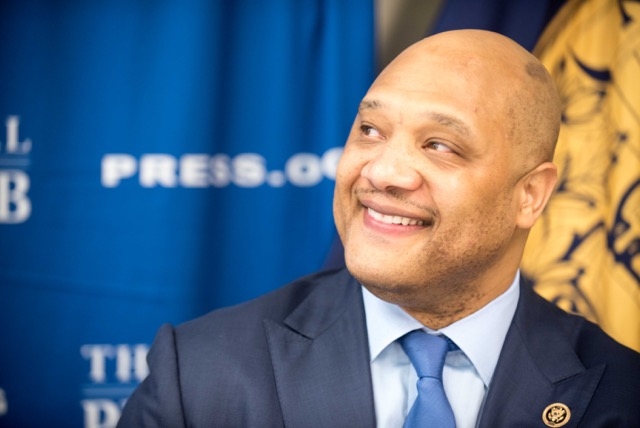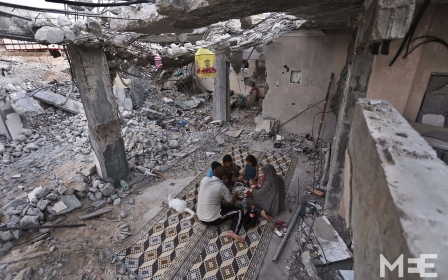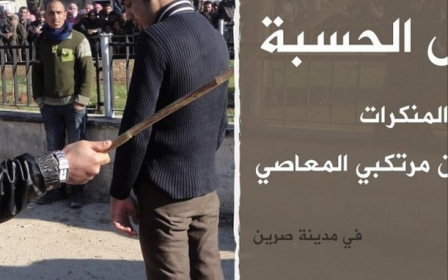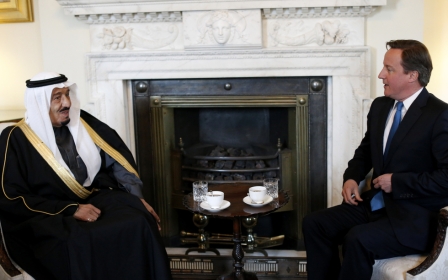For Muslims incarcerated in US, Ramadan brings extra challenges

WASHINGTON - When Ramadan begins at sundown on 5 June, more than a fifth of the world’s population will observe the month-long rituals of fasting and prayer. For the hundreds of thousands of Muslims incarcerated in the US prison system, however, Ramadan will bring additional challenges.
Because Ramadan is held 10-12 days earlier each year, observant Muslims will be celebrating the holiday during the longest hours of daylight in over a decade. With about 350,000 Muslims incarcerated in the US (albeit with varying levels of observation), ensuring the health and nutrition of inmates, especially those on work duty, requires vigilance.
“Being incarcerated is already a physical and mental strain, and then to incorporate fasting, a support system in a prison context is so helpful,” Representative Andre Carson (D-Indiana), one of two Muslim members of Congress, told Middle East Eye.
“But you also have to have a warden who is conscious, who will make necessary accommodations for a person to practice their faith. Because when you have someone who can practice their faith, you have a better inmate, and a better future contributor to society.”
“Now some will argue, well this person shouldn’t have committed a crime, they wouldn’t have been in prison in the first place,” Carson told MEE. “Well, if a person is really trying to reform, to then leave that situation and be a contributor to society, I think they should be given a chance.”
Michael “Mikal” Saahir is imam of the Nur-Allah Islamic Center in Indianapolis, and has worked with incarcerated Muslims for decades. He says that the greatest challenge for prison officials during Ramadan is meeting the nutritional needs of their inmates.
“Most of these prisons have regular mess hall hours. So you have a regular breakfast schedule at 7, maybe, and dinner in the mess hall at 5, for example,” he told MEE.
“During Ramadan, you’re not suddenly feeding everyone at once, you have to have a separate breakfast and dinner.”
Saahir said that several people he counsels told him of early meals that consisted of a small sandwich and a drink.
“I thought it was a snack,” he said. “How do you expect to go through 16 hours of work duty, on a hot day, with just that small meal and be healthy?”
“There’s definitely room for improvement in meeting nutritional needs,” Saahir said.
Adding to those challenges of additional mealtimes and inmate movements throughout the day is the lingering perception that Muslim inmates gathering in a large group pose a security risk. A report from the Institute for Social Policy and Understanding entitled "Facts and Fictions about Islam in Prison: Assessing Prisoner Radicalization in Post-9/11 America," however, found that perception is largely myth.
“There is little evidence of widespread radicalisation or successful foreign recruitment, and only one documented case of prison-based terrorist activity,” the report reads.
“Nonetheless, some prison systems have implemented an aggressive posture towards these inmates and have made suppressive tactics their bedrock policy. This approach unfortunately overlooks Islam’s long history of positive influence on prisoners, including supporting inmate rehabilitation for decades.”
Congressional hearings have been convened on the threat of prisoner radicalisation in America in the past several years, which Christian, Jewish and Muslim religious leaders have denounced as political theatre.
Ensuring Muslim prisoners are not forgotten is a key mission of the National Coalition to Protect Civil Freedoms. Executive Director Maha Hilal says in the post-9/11 prison climate, it is a tricky endeavour, as even prison advocate groups tend to shy away from the political landmine of advocating for Muslim prisoners’ rights.
“Muslim political prisoners tend to be ignored in the broader conversation about mass incarceration and prison reform. People know the high-profile cases, but there are a lot of low-profile cases as well, and these are the people who are at risk of being forgotten,” Hilal told MEE.
She said that the coalition has identified 178 cases of pre-emptive prosecutions, that is, people who have been entrapped, and were not ever going to commit a crime, but fell victim to an agent provocateur, Hilal told MEE.
“Some are mentally ill, or have a low IQ. They had no ability to undertake a criminal act, no money or weapons, except what was provided to them by the FBI.”
Hilal said that during Ramadan, Muslim inmates may be especially burdened by a lack of community, and the inability to celebrate in a group setting.
“A lot of prisoners are in solitary confinement,” she told MEE. “They can’t receive letters or visits or phone calls except from designated family members.”
The organisation hosts a volunteer penpal program, and during Ramadan, a letter-writing campaign.
“We aim to provide at least one letter per prisoner, and $100 for their canteen accounts to help them break fast. We say, we remember you, we remember you’re behind bars. You haven’t been forgotten.”
As with the inmate population in general, inmates who receive visits from volunteers or religious leaders are treated better.
“I get phone calls and letters from people all the time who ask for books, or for visits, or services,” Saahir said. “For many, just knowing they haven’t been forgotten is so important.”
Whether unfairly imprisoned or not, all inmates benefit from a strong sense of community, and administrative support during the challenges of Ramadan. Being able to pray and fast with fellow worshippers helps the days seem shorter, the meals richer and the workloads lighter.
Saahir says that rather than being wary of Ramadan celebrants, prison officials should recognise the benefits, not only to the inmate, but to the prison population at large, Muslim or not.
“Ramadan is the practice of self-restraint. That works well in a prison system. Control over your own emotions and anger,” Saahir says. “For the believer, it says I am the master over my body, my mind and my will, and I submit to Allah.”
New MEE newsletter: Jerusalem Dispatch
Sign up to get the latest insights and analysis on Israel-Palestine, alongside Turkey Unpacked and other MEE newsletters
Middle East Eye delivers independent and unrivalled coverage and analysis of the Middle East, North Africa and beyond. To learn more about republishing this content and the associated fees, please fill out this form. More about MEE can be found here.




